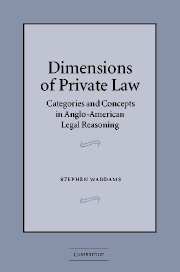Book contents
- Frontmatter
- Contents
- Preface
- Table of cases
- 1 Introduction: the mapping of legal concepts
- 2 Johanna Wagner and the rival opera houses
- 3 Liability for economic harms
- 4 Reliance
- 5 Liability for physical harms
- 6 Profits derived from wrongs
- 7 Domestic obligations
- 8 Interrelation of obligations
- 9 Property and obligation
- 10 Public interest and private right
- 11 Conclusion: the concept of legal mapping
- Works cited
- Index
3 - Liability for economic harms
Published online by Cambridge University Press: 15 July 2009
- Frontmatter
- Contents
- Preface
- Table of cases
- 1 Introduction: the mapping of legal concepts
- 2 Johanna Wagner and the rival opera houses
- 3 Liability for economic harms
- 4 Reliance
- 5 Liability for physical harms
- 6 Profits derived from wrongs
- 7 Domestic obligations
- 8 Interrelation of obligations
- 9 Property and obligation
- 10 Public interest and private right
- 11 Conclusion: the concept of legal mapping
- Works cited
- Index
Summary
In a complex society the activities of some necessarily damage the economic interests of others, but often no legal obligation to pay compensation has been recognized even though the damage is foreseeable, foreseen, and intended. Such cases are ‘of daily occurrence’ and include competition in trade and business, invention and promotion of new products, services, and techniques, activities of labour unions, political contests, consumer boycotts, campaigns against activities thought to be immoral or unhealthy, defamatory statements that are true or privileged, use of land, advice to a person adverse in interest to the plaintiff, contractual negotiation with the plaintiff, and advice to a donor not to proceed with an intended gift. ‘It is essential to an action in tort’, the Privy Council said in 1860, ‘that the act complained of should … be legally wrongful as regards the party complaining, that is, it must prejudicially affect him in some legal right; merely that it will harm him in his interests is not enough’. A distinction between physical injury and economic harm has therefore on this view been necessary: intentional injury to person or tangible property always affects the person injured ‘in some legal right’, damage to economic interests only sometimes. But, as to precisely when, as John Fleming has said, ‘no consensus … has emerged after [long] judicial grappling with the problem’.
- Type
- Chapter
- Information
- Dimensions of Private LawCategories and Concepts in Anglo-American Legal Reasoning, pp. 40 - 56Publisher: Cambridge University PressPrint publication year: 2003



